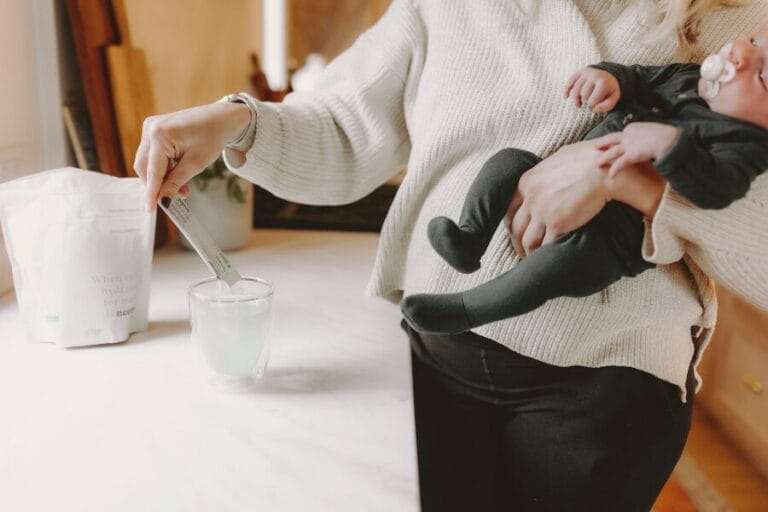Creating A Postpartum Plan Will Help You Thrive As New Parents
Why You Should Create a Postpartum Plan
The arrival of a new baby brings immense joy but also significant changes. We’re not gonna lie, those first few weeks aren’t all rainbows and butterflies. Having a postpartum plan in place can reduce stress and help you manage your new responsibilities as a team. Once your baby arrives, you may not have the time or energy to make important decisions or seek out the assistance you need. Now is the time to have conversations with your partner, like: Should we hire a postpartum doula to help with infant care? Do I want to breastfeed, try bottle-feeding or a mix or both? What will our visitor policy be in the first two weeks postpartum? Discussing these things upfront can ensure you feel supported and avoid feeling overwhelmed when you’re in the depths of sleep deprivation.
Planning ahead allows you to prepare for common postpartum challenges and ensures that your needs are met. Whether it’s organizing help with household chores, arranging for meals, or scheduling visits from family and friends, having a plan in place can make a significant difference!

Plan In Advance
Like a birth plan, creating a comprehensive postpartum plan involves addressing several key areas and considering different situations. Let’s explore each one in detail.
SLEEP
Sleep is crucial for both you and your baby during the postpartum period. If you’re already a bad sleeper, start working on improving your sleep habits now. Our 5 Tips for Sleep can help! Aim to create a sleep environment that is conducive to rest. This includes ensuring your bedroom is dark, quiet, and cool. Consider using white noise machines or blackout curtains to enhance your sleep quality.
It’s essential to understand the amount of sleep you need and how to achieve it. Yes this means your Bravo binges might need to be paused to ensure you are catching those all important zzzz’s whenever you can! Establish a sleep schedule that allows for regular naps throughout the day and nighttime rest. Be mindful of your baby’s sleep patterns and try to align your schedule with theirs as much as possible. This can help reduce anxiety about your baby’s sleep and ensure you both get the rest you need.
EMOTIONS AND HORMONES
The postpartum period can bring a rollercoaster of emotions and hormonal changes. Understanding the hormone timeline can help you prepare for what to expect. Hormonal fluctuations can affect your mood, energy levels, and overall well-being. Being aware of these changes can help you recognize and address any emotional challenges you may face. 80% of women experience the baby-blues, which many women characterize as unexplained sadness and teariness. This is a transient period and you should noticing lessening or finding relief around the two-week mark. If you are still experiencing bouts of sadness after that point you’ll want to talk to your partner and health care provider. Remember mama, 1 in 5 women experience perinatal mood and anxiety disorders, you’re not alone!
There are several things you can do to support your emotional health during this time. Maintaining a balanced diet, getting enough sleep, and practicing mindfulness can all contribute to emotional well-being. Consider incorporating activities like meditation or gentle exercise into your routine to help manage stress and promote relaxation. The Matrescence® App was designed with the modern mom in mind. It includes actionable emotional health exercises; including journal prompts, meditations, guided breathwork videos, and calming affirmations created by accredited professionals to help you find calm in the chaos. Start your free trial today!

PHYSICAL POSTPARTUM RECOVERY
Physical recovery after childbirth is a significant aspect of the postpartum period. Whether you’ve had a vaginal delivery or a C-section, your body will need time to heal. Understanding how to care for yourself during this time is crucial.
If you’ve had a C-section, there are specific considerations for sleeping comfortably. Elevating your upper body with pillows and avoiding certain positions can help reduce discomfort. It’s also essential to know what activities to avoid postpartum to prevent complications and promote healing. Stock up on postpartum essentials like pads, comfortable clothing, and pain relief options to ensure you have everything you need for a smooth recovery.
RELATIONSHIPS AND POSTPARTUM SUPPORT
Your relationships, especially with your partner, will play a vital role in your postpartum experience. Open communication with your partner about what you may experience physically and emotionally can help set realistic expectations. Discussing how they can be most helpful to you—whether it’s taking over specific responsibilities, providing emotional support, or managing household tasks—can make a significant difference.
Consider planning when and how family and friends will meet your baby. Setting boundaries and communicating your needs can help ensure these interactions are positive and supportive. Remember, it’s okay to ask for help and prioritize your well-being during this time.
PREPARING FOR POSTPARTUM COURSE
For those seeking additional support and guidance, consider enrolling in our “Emotionally Preparing for Postpartum” course. This course covers everything you need to know to emotionally prepare for the transition into motherhood. From understanding hormonal changes, understanding risk factors and symptoms of postpartum mood disorders, to developing healthy coping strategies and prioritizing self-care, our course provides valuable insights and practical tips to help you thrive in motherhood.
HAVING A PLAN BUILDS CONFIDENCE
Creating a postpartum plan is a proactive step towards ensuring a smooth and supported transition into parenthood. By addressing key areas like sleep, emotions, physical recovery, and relationships, you can set yourself up for success. Remember, planning ahead can reduce stress and help you manage the challenges of the postpartum period more effectively.
If you’re ready to take the first step, download our free postpartum plan template and start customizing it to your needs. For additional support, consider enrolling in our “Emotionally Preparing for Postpartum” course. Together, we can help you navigate this exciting time with confidence.









